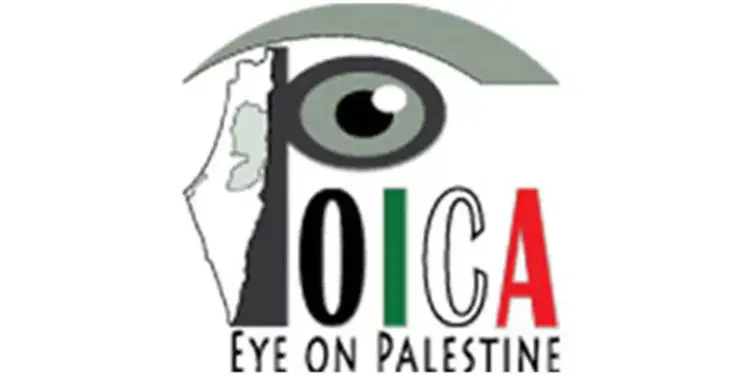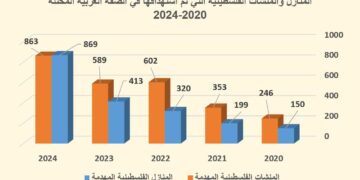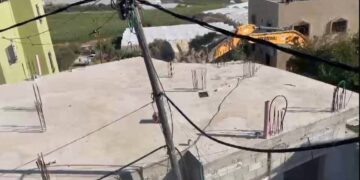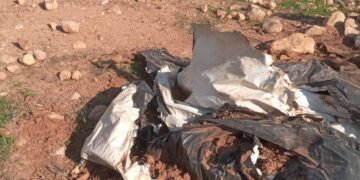- Violation: demolishing a commercial facility selling vegetables.
- Location: Al-Jalama village, north of Jenin.
- Date of violation: 29/06/2022.
- The aggressor: the so-called building inspector of the Israeli Civil Administration.
- The affected party: the citizen Omar Ali Salem Abu Zaho.
- Details of the violation:
On Wednesday afternoon, (29/6/2022), the Israeli occupation army, in coordination with the so-called construction inspector of the Israeli Civil Administration, stormed the southern area completely adjacent to the Al-Jalama military checkpoint, where a commercial store in the form of a metal barracks selling vegetables and fruitswith on an area of 72 m² was targeted. It is located on the road leading to the crossing chick-point, where the barracks were completely demolished by a civilian bulldozer that was accompanied by the occupation army, and the damaged citizen, the owner of the store, called Omar Ali Salem Abu Zaho, a resident of Al-Jalama village, was not allowed to take out anything but a small amount of vegetables that were intended for sale.
It is noteworthy that the (barracks) was previously targeted, in addition to a number of commercial barracks adjacent to it, through a military notifications issued by the so-called building and organization inspector of the Israeli occupation on (06/26/2022), which includes giving an additional opportunity to object to an order of demolition that have been issued by the organizational committee of the occupation, where the occupation set a period not exceeding seven days to object to a demolition order, but in fact the barracks was demolished before the expiry of the period for submitting the objection according to what was stated in the military notification. Noting that during the month of February the same citizen received an order to stopping the construction on the pretext of not having a license for the same barracks, and despite the preparation of the legal file and the license file, the occupation demolished it and refusing any legal procedure for licensing.
 Photo 1: After the barracks was demolition
Photo 1: After the barracks was demolition
 Photos 2: During the demolition of the barracks
Photos 2: During the demolition of the barracks
The affected citizen is considered the breadwinner of a family consisting of (5) members, including (2) females, and (2) children within the family.
For his part, the affected citizen stated:
“The damaged barracks that was demolished is my only source of income, and I have no other source of work to help my family. Personally, because of my health condition, I am unable to find another job to be able to help my family with, and now I am unemployed, and my loss is great, reaching 32 thousand shekels”.
It is noteworthy that, last February, the occupation demolished at least 20 stands and shops along the main road leading to the Al-Jalama crossing, causing harm to a large number of citizens and depriving them of their most basic human rights to secure the income and dignity of their families.
As the occupation seeks to empty the area completely, and restrict the citizens there, the occupation during the past five years, had demolished a large number of these commercial stands in the area.
Al-Jalama[1]:
Al-Jalama is located 7 km to the north of Jenin; It is bordered by the green line – occupied territories of 1948 (north), Al-Yamoun village (west), ‘Arbona village (east), ‘Arana village (south).
Al-Jalama has a population of 2268 people, until 2017 census.
Al-jalama village is within the borders of Marj Bani Amer village council. Marj Bani Amer has an area of 65,656 dunums, of which 265 dunums are a built up area for Al-Jalama. The village council of Marj Bani ‘Amer contains the following community: (Al-Jalama, Al-Jmailat, Um Qaboub, Barghasha, Beit Qad, Jalboun, Khirbet Abu ‘Anqar, Deir Abu Da’ef, Deir Ghazala, ‘Arana, ‘Arbouna, Faqou’a, Mashro’a Beit Qad, Wadi Al-Dabe’a).
Al-Jalama village consists of 4 artesian wells that provided water for the village, the artesian wells were managed by: Salim Abu Farha, Jamal Abdul –Hadi, l Yasin Soboh, and Abu Issa company. According to the village council each one of the wells produced about 100 cup/ per hour, but the occupation did not only confiscate them but also dried them, now citizens have to buy water even with their high poverty rates.
Most of Al-Jalama lands are invested in rainfed agriculture, while 400 dunums are invested in protected agriculture, 300 dunums are olive groves, 350 dunums are invested in irrigated agriculture (source: Al-Jalama village council).
The village of Al-Jalama and the two towns of Sandala and Al Muqbeila (occupied in 1948) used to have social and economic ties as well as family ties as they were considered to be one unit. The clans present in these three towns include Al Omari, Abu Farha, Sahori, Sha’aban, Abu Issa in addition to the clan of Radi. These communities used to have one school and one mosque until the Nakba took place in 1948 when these communities were forcefully separated.
The occupation confiscated 400 dunums, bypass 60 ate up 100 dunums, the segregation wall ate up 300 dunums, and isolated 100 dunums, the segregation wall is 3500 m long.
Oslo accords divided the land as the following:
- Area B: 250 dunums.
- Area C: 65,406 dunums.
Legal Feedback:
The demolition of Palestinian homes and facilities by the occupation authorities comes within its violations of international and humanitarian law, and a violation of a right of Palestinian citizens guaranteed by international law and international treaties, which is the right to adequate housing, within the following articles:
- Article 147 of the Fourth Geneva Convention:
Stipulates that “extensive destruction and appropriation of property, not justified by military necessity and carried out unlawfully and wantonly” is a “grave breach” of the Convention.
- Article 53 of the Fourth Geneva Convention of 1948:
Any destruction by the Occupying Power of real or personal property belonging individually or collectively to private persons, or to the State, or to other public authorities, or to social or cooperative organizations, is prohibited, except where such destruction is rendered absolutely necessary by military operations.
- Article 33 of the Fourth Geneva Convention states:
- No protected person may be punished for an offence he or she has not personally Collective penalties and likewise all measures of intimidation or of terrorism are prohibited.
- Pillage is prohibited.
- Reprisals against protected persons and their property are prohibited.
- Paragraph ‘G’ of Article 23 of The Hague Convention of 1907 (warns against):
(G) To destroy or seize the enemy’s property, unless such destruction or seizure be imperatively demanded by the necessities of war.
- Article 17 of the Universal Declaration of Human Rights:
Everyone has the right to own property alone as well as in association with others. No one shall be arbitrarily deprived of his property.
[1] GIS – LRC
Prepared by
The Land Research Center
LRC













